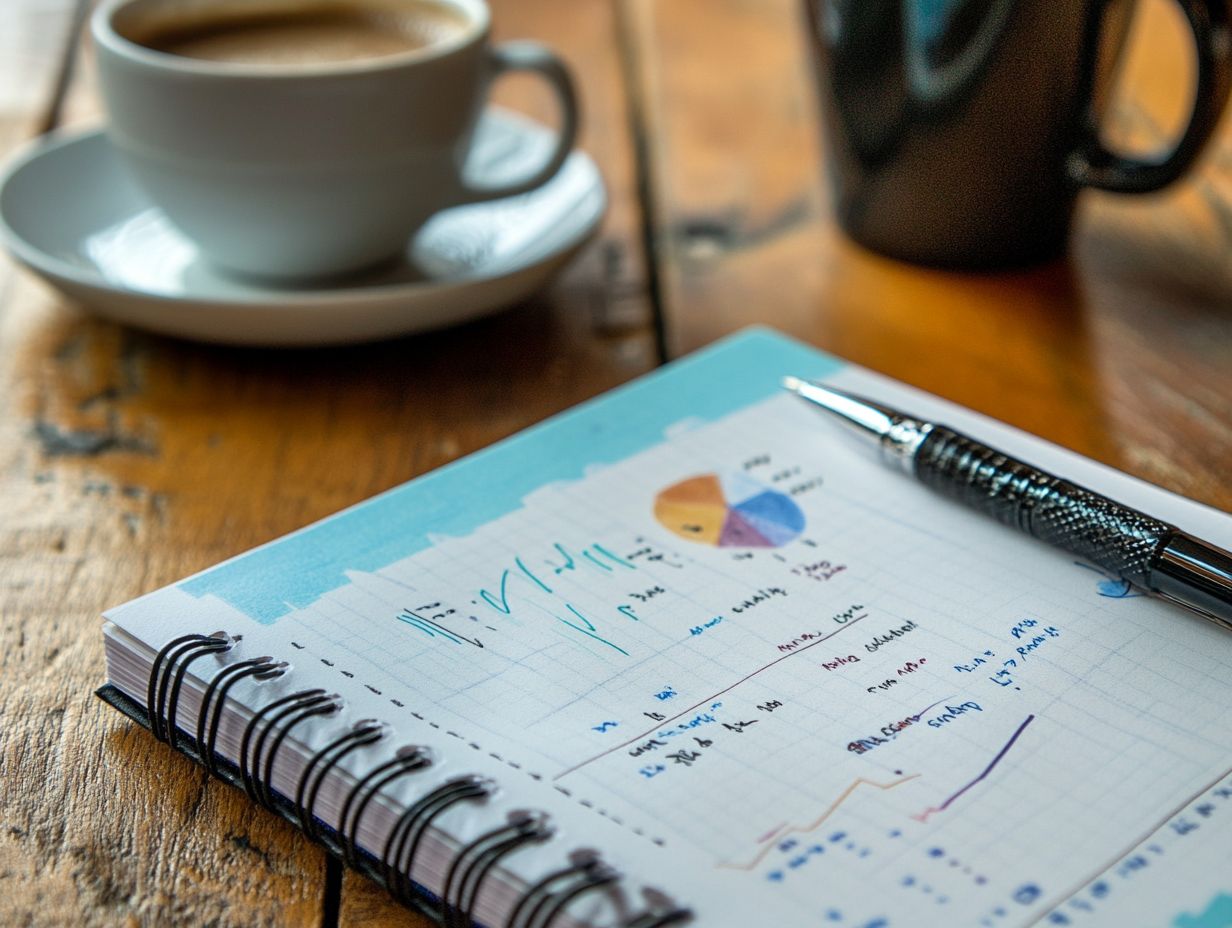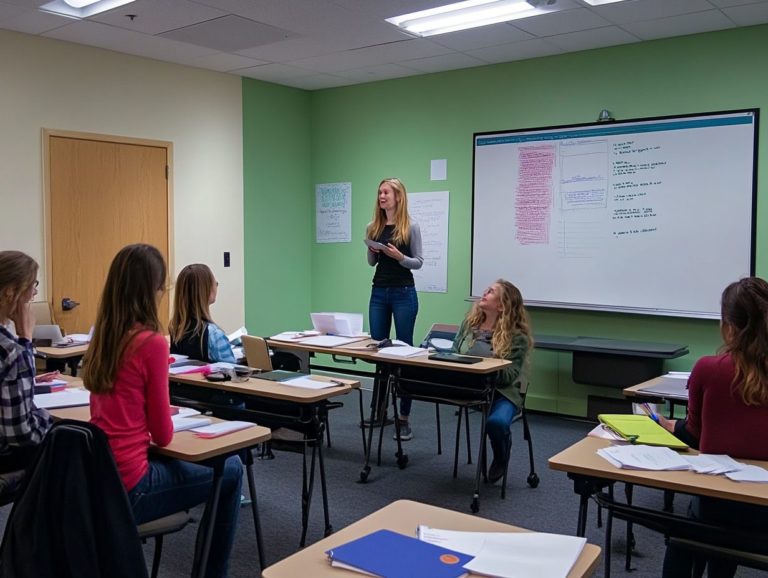how to keep track of your practice progress
Tracking your practice progress is essential for anyone eager to enhance their skills, whether you re a musician, athlete, or student.
By monitoring your journey, you gain valuable insights that can propel you toward your goals. This article explores the benefits of tracking, effective methods to implement, and key metrics to focus on.
You’ll also discover tips for maintaining consistency and strategies for analyzing your progress to foster continuous improvement.
Get ready to supercharge your practice!
Contents
- Key Takeaways:
- Why Tracking Your Practice Progress is Important
- Methods for Tracking Practice Progress
- Using a Journal or Planner
- Tracking Apps and Tools
- What to Track
- Specific Metrics and Goals
- Tips for Staying Consistent with Tracking
- Reviewing and Analyzing Your Progress
- Frequently asked questions
- What is the importance of keeping track of your practice progress?
- How often should I track my practice progress?
- What are some effective ways to keep track of my practice progress?
- What should I include in my practice journal?
- How can I use technology to track my practice progress?
- What should I do if I am not seeing the progress I want?
Key Takeaways:

- Consistently tracking your practice progress can help you reach your goals more efficiently.
- Consider using a variety of methods, such as journaling, tracking apps, and setting specific metrics to monitor your progress.
- Regularly reviewing your progress can help you identify patterns and areas for improvement, leading to even more success in your practice.
Why Tracking Your Practice Progress is Important
Tracking your practice progress is crucial for musicians aspiring to elevate their skills and reach their goals. It offers a structured approach to monitor your performance, pinpoint mistakes, and receive invaluable feedback, enhancing your understanding of both strengths and weaknesses.
Using effective tracking methods fosters a sense of accountability and boosts your efficiency, ultimately paving the way for greater success in your musical journey.
Using tools like an error log and a practice log allows you to visualize your progress. This serves as a powerful motivator that can transform your approach and guide you toward sustained growth and accomplishment.
Benefits of Tracking
Tracking offers numerous benefits that can elevate your journey toward musical mastery. By keeping a close eye on your progress and performance, you gain clear insights that illuminate your path.
Documenting your practice sessions enables you to receive constructive feedback, pinpointing areas for improvement and guiding you toward effective strategies. This engagement fosters accountability and helps you set realistic goals tailored to your aspirations.
As you consistently monitor your progress, you’ll identify patterns, enabling targeted adjustments that lead to significant skill enhancement. Over time, this diligent tracking cultivates a mindset of continuous improvement, transforming each practice session into a valuable opportunity for growth.
Ultimately, embracing this approach turns your musical journey into a rewarding path of self-discovery and artistic expression.
How it Can Help You Reach Your Goals
Tracking your practice progress can revolutionize your musical journey, offering insights that inform your practice decisions and foster meaningful improvement. By setting Specific, Measurable, Achievable, Relevant, and Time-bound goals and regularly assessing your performance, you can craft a roadmap to tangible achievements.
This structured approach instills accountability and allows you to celebrate milestones, fueling motivation as you navigate your path to success.
Ongoing assessments help you understand your unique strengths and areas for growth, guiding effective adjustments to your practice routines. Musicians who harness performance metrics often find themselves more focused, visualizing their journey through quantifiable data.
This aligns beautifully with the philosophy of continuous improvement, turning every session into an opportunity for reflection and refinement. Embracing this analytical mindset strengthens your commitment to your artistic journey and transforms your skills and passion for music itself.
Methods for Tracking Practice Progress
A wealth of methods exists for tracking your practice progress, each offering distinct advantages tailored to your learning style and preferences.
Whether you prefer traditional practice logs or the convenience of modern tracking apps, you can select the approach that aligns best with your needs.
By integrating elements such as video tutorials and learning management systems, you can elevate your tracking experience, effectively monitoring your growth while leveraging various resources to refine your strategies.
Start tracking your practice today to unlock your full potential!
Using a Journal or Planner

A journal or planner is a powerful tool for tracking your practice. It allows you to document your sessions in detail.
This method encourages you to reflect on your achievements and mistakes. It fosters accountability and helps you commit to improvement.
By regularly using a practice log, you can customize your training plans. This keeps you focused on your goals and aware of your growth.
These tools help create a structured environment. You can outline both short-term and long-term goals, breaking larger aspirations into manageable tasks.
Writing down your objectives enhances your commitment. It solidifies your intentions and provides a visual reminder of what you aim to achieve.
Set aside time at the beginning or end of each week to review and adjust your goals based on your progress. This offers insights into your practice habits and motivates you to stay consistent.
Integrating journals and planners into your routine cultivates self-discipline and helps track your incremental improvements. This leads to a more organized and effective practice experience.
Tracking Apps and Tools
Tracking apps and tools have transformed how you monitor your practice progress. They provide intuitive interfaces that make documenting your sessions a breeze.
These digital solutions enable you to set Specific, Measurable, Achievable, Relevant, Time-bound (SMART) goals. You can track your achievements and analyze your growth over time.
Using apps with features like error logs and feedback mechanisms optimizes your practice sessions. You can ensure you’re on track to reach your long-term aspirations.
Tools like ToneSavvy and SmartMusic offer personalized practice suggestions. They give you real-time feedback on your technique and timing.
You can share your progress and collaborate with peers, which fosters a sense of community and accountability. This ultimately enhances your motivation and productivity throughout your musical journey.
What to Track
Understanding what to track during your practice sessions is essential for maximizing your growth. Key metrics to consider include:
- Your performance levels
- Specific goals
- Practice duration
- Areas that need improvement
By diligently monitoring these elements, you gain valuable insights into your progress. This enables you to refine your training strategies and tailor your practices for the best possible results.
Specific Metrics and Goals
Specific metrics and goals are essential components of an effective tracking system. They guide you on your practice journey as a musician.
Establishing clear performance benchmarks and regularly assessing your progress helps you pinpoint areas needing focused attention.
This structured approach ensures that every practice session is purposeful and aligned with your overarching goals.
Consider various metrics such as:
- Practice hours
- Songs or pieces you have learned
- Consistency of performance
Setting specific goals related to technique, expression, and improvisation provides a clear roadmap for growth. Evaluating your performance through metrics like audience engagement and social media presence offers valuable insights.
These performance indicators help you track your growth and motivate you to reach new heights. By being mindful of these elements, you cultivate a rewarding practice experience that evolves alongside your skills.
Tips for Staying Consistent with Tracking
Maintaining consistency in tracking your practice progress is essential for maximizing its benefits. Establishing a routine can be an effective strategy to achieve this.
By incorporating tracking into your daily practice schedule, you cultivate a habit that promotes accountability and keeps your goals in sight.
Adopting a structured approach streamlines the process and inspires you to sustain your progress over time.
Creating a Routine

Establecer una rutina para rastrear tus sesiones de pr ctica es vital para construir la consistencia y cultivar un sentido de responsabilidad. Al asignar slots de tiempo espec ficos tanto para la pr ctica como para el seguimiento, te aseguras de que tu crecimiento tenga prioridad y de que te mantengas dedicado a tus objetivos.
Esta rutina estructurada no solo agudiza tu enfoque. Tambi n integra de manera fluida el proceso de seguimiento en tu viaje general de pr ctica.
Adoptar una variedad de m todos de seguimiento ya sea a trav s de la redacci n de logros diarios o utilizando aplicaciones digitales puede elevar significativamente esta rutina.
Cada sesi n de pr ctica debe comenzar con el establecimiento de objetivos claros y alcanzables. Esto permite la reflexi n al final para reforzar tu sentido de progreso.
Considera incorporar reflection points regulares en tu horario. As podr s evaluar tu rendimiento y ajustar tus rutinas seg n sea necesario. Este enfoque din mico no solo promueve la mejora continua, sino que tambi n profundiza tu comprensi n de tu arte, manteniendo viva tu motivaci n y fomentando un enriquecedor viaje de exploraci n musical de por vida.
Accountability Strategies
Implementing accountability strategies can significantly elevate the effectiveness of your tracking process, ensuring you remain steadfast in your practice goals. Consider enlisting the support of a mentor, joining a community of musicians, or sharing your progress with peers.
By cultivating a network of accountability, you can motivate one another and create a sense of shared purpose in your musical journeys.
These strategies not only boost motivation but also foster a rich environment for growth where constructive feedback and diverse perspectives refine your skills. Engaging with mentors provides invaluable insights, while a supportive community helps you celebrate milestones and navigate challenges.
Mutual accountability encourages you to set clear, measurable goals. This leads to a profound sense of accomplishment as you track your progress together. By embracing these collaborative approaches, you are more likely to stay disciplined, inspired, and enabled throughout your creative endeavors.
Reviewing and Analyzing Your Progress
Reviewing and analyzing your practice progress is an essential step on your path to musical mastery. It enables you to pinpoint patterns and areas that need improvement.
By regularly assessing your performance and reflecting on your practice sessions, you can discover valuable insights that will supercharge your practice!
This proactive approach not only sharpens your ability to adapt your training strategies but also cultivates a culture of continuous learning and growth in your musical journey.
Identifying Patterns and Areas for Improvement
Identifying patterns in your practice performance is essential for pinpointing areas that need improvement and optimizing your approach to tracking. By analyzing the data you collect over time, you can uncover trends and correlations, which are connections between different data points, that will inform your practice strategies.
This thorough examination highlights specific techniques or pieces where you might be struggling. It also reveals the optimal practice schedules and methods tailored to your needs.
As you gain insights, you can adjust your focus. This ensures that your time and energy are directed toward the areas that most significantly impact your growth.
Utilizing tools to track your progress provides you with a clearer picture of your advancement. This makes it easier to celebrate those small victories and maintain your motivation.
By continuously reflecting on these patterns, you cultivate a proactive mindset. One that is geared toward consistent improvement and ultimate performance excellence.
Frequently asked questions
What is the importance of keeping track of your practice progress?

Keeping track of your practice progress allows you to see how much you have improved, identify areas that need more work, and set realistic goals for the future.
How often should I track my practice progress?
It is recommended to track your practice progress at least once a week. This will give you a good understanding of your progress and allow you to make necessary adjustments to your practice routine.
What are some effective ways to keep track of my practice progress?
Keep track of your practice progress with a journal, a tracking app, or by recording yourself. Set specific goals and check your progress regularly.
What should I include in my practice journal?
Your journal should note the date and time spent practicing. Include the skills or methods you focused on, along with any challenges or breakthroughs.
How can I use technology to track my practice progress?
Many apps let you track your practice time and set goals. Use video recordings to visually assess your progress and spot areas to improve.
What should I do if I am not seeing the progress I want?
Not seeing the progress you crave? Let s shake things up! Assess your routine for consistency and effectiveness. Seek feedback from a teacher or mentor for fresh insights.





